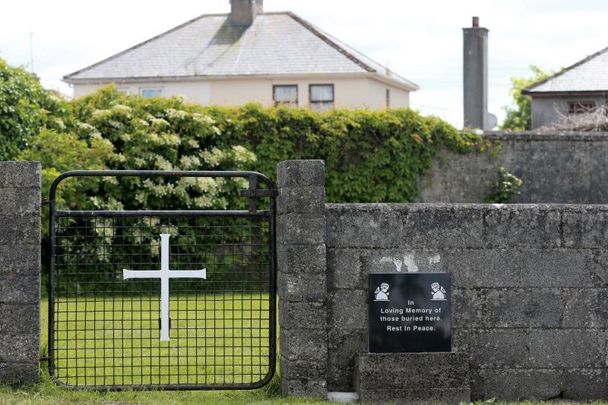- Lifestyle & Sports
- 13 Jul 22
President Higgins signs Burials Bill into law allowing for the excavation of remains at the sites of former mother and baby homes

The long-awaited bill allowing for the excavation of remains at the sites of former mother and baby institutions was signed into law today, July 13, by President Michael D. Higgins.
The Institutional Burials Bill 2022 that allows for the excavation of remains at the sites of former mother and baby homes has been signed into law by President Michael D Higgins.
The legislation passed the final stage in the Oireachtas Thursday last and has now been made law.
The burials bill will allow for the excavation, recovery, analysis, and formal burial of remains at sites like the former mother and baby home in Tuam in Co Galway. Other previous institution sites may also be excavated, however, the former Bon Secours institution in Tuam is currently the priority for the Government.
This bill will also allow DNA-based identification to be undertaken in order to reunite families with the remains of their loved ones, granting these children the dignified burial they so deserve.
Concerns have been expressed by survivors and relatives that other sites possibly won't be excavated for several years, until the Tuam site process is well underway or complete.
Following claims that 796 babies were disposed of in an unmarked mass grave in Tuam, the Commission of Investigation into Mother and Baby Homes was set up. These claims were made following research carried out by local historian Catherine Corless.
Based on the establishment of the commission, excavations were carried out on the site between November 2016 and February 2017. The findings revealed a significant quantity of human remains interred in a vault on the site.
Tuam Babies Family Group representative Anna Corrigan said that the Tuam site needs to be urgently excavated as families have waited long enough for answers. "They started digging in 2016 and 2017. They should have kept going then, it could have been resolved at this stage," Corrigan said.
The representative questioned how long it will take to set up the agency tasked with overseeing the excavation of sites such as Tuam while speaking to The Journal earlier today, July 13. "How long is it going to take to set up this agency?" Corrigan asked. "It could take four or five years to get staff in. That’s just for Tuam and the Bill is not confined to Tuam – what about other institutions?
"The devil is in the detail."
Corrigan has personal ties to the Tuam site, where her two brothers, John and William, were born. A death notice was issued for John, but it is still unclear whether her brother William was illegally adopted or both of the boys were buried at the site. Hopefully, the proposed DNA testing will give the Corrigan family a clearer picture and time to grieve.
 Tuam mother and baby home site
Tuam mother and baby home sitePre-legislative scrutiny recommendations and concerns expressed by family representatives led to changes in the bill by Children’s Minister O’Gorman including:
- The restriction on the jurisdiction of the coroner has been removed entirely
- The role of the director has been strengthened to include forensic excavation, recovery and analysis of remains to support, where possible, establishing circumstances and cause of death, in line with international standards and best practice
- A new advisory board, chaired by a former coroner or someone with coronial expertise, will provide for scientific and family input and enhance transparency and accountability
- The identification programme has been expanded to allow for the participation of grandparents, grandchildren, aunts, uncles, nephews and nieces
- A requirement for a pilot has been removed from the identification programme, allowing identification to be undertaken on each set of remains where possible
In February, when the legislation was launched, O’Gorman said the excavation at the Tuam site will be "one of the most complex forensic excavation and recovery efforts ever undertaken not only in Ireland but anywhere in the world."
The Minister added: "What happened at Tuam is a stain on our national conscience. The Institutional Burials Bill will allow us, at long last, to afford the children interred at Tuam a dignified and respectful burial. I have listened carefully to families, survivors, and independent experts in order to strengthen and improve the legislation, and this is reflected in the Bill approved by Government.
"It is now five years since remains were confirmed at the site in Tuam, and I believe that the families affected have had to wait far too long for exhumation to commence…
"I am absolutely committed to now advancing the Bill as quickly as possible. If it is enacted, I intend to establish an Office of the Tuam Director and start the excavation later this year."
Catherine Coreless, the historian behind these findings in Tuam, was pleased with the publication of the legislation in February.
"The amendments made to the legislation are positive and very welcome. This is what many relatives have asked for right from the start. They will have no closure until they know if a loved one is buried in Tuam," the historian told The Journal at the time.
RELATED

- Lifestyle & Sports
- 20 Jan 26
Dublin players plan protest over Allianz sponsorship

- Lifestyle & Sports
- 20 Jan 26
James McClean returns to Derry City

- Lifestyle & Sports
- 09 Jan 26
Second drop of KNEECAP x Bohemian FC jerseys to go on sale today
RELATED

- Lifestyle & Sports
- 19 Dec 25
Tullamore D.E.W. Distillery: Gift an experience that engages every sense

- Lifestyle & Sports
- 15 Dec 25
Bohemian FC and KNEECAP team up for new jersey fundraising for ACLAÍ Palestine

- Competitions
- 12 Dec 25
WIN: Lunch For Two From Forge Wood Fired Pizza

- Lifestyle & Sports
- 12 Dec 25



